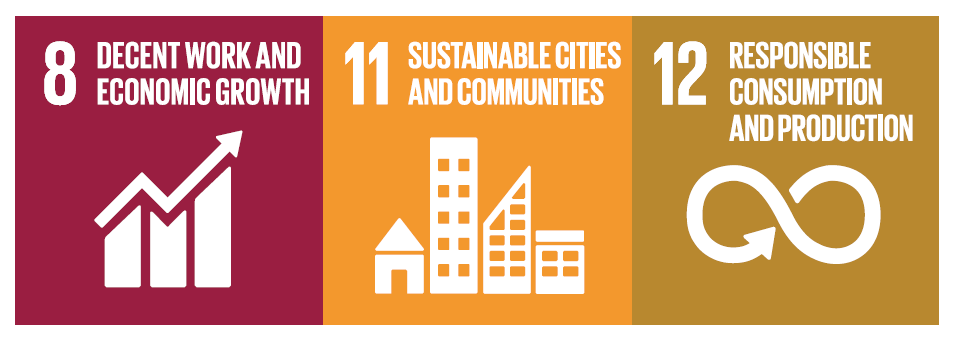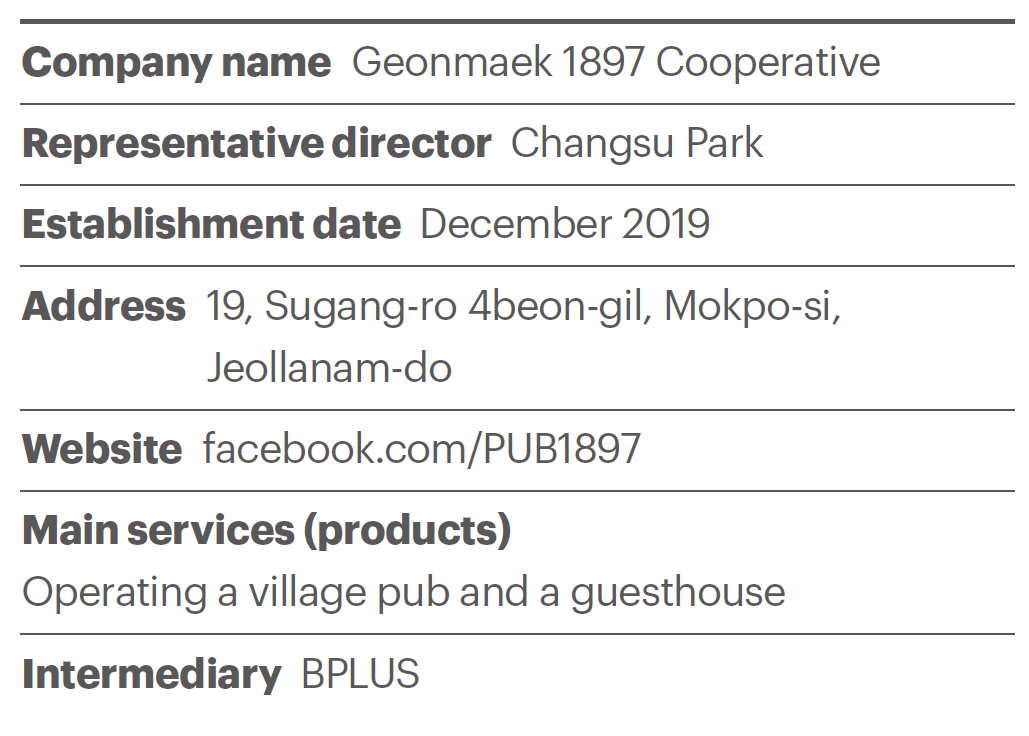Category: Social Housing and Community Ownership
Impact related to UN SDGs:

Investee summary

Interview
“We pride ourselves on having established a cooperative together with local merchants and residents and have created social value through community ownership, regional regeneration and job creation.”
Q. Please describe your company.
The Geonmaek 1897 Cooperative was established with the aim of revitalizing the dried seafood street in the inner-city area of Mokpo, Jeollanam-do. There had been some tourism in this area, but in 2019, following the success of the Geonmaek 1897 Festival, which promoted local specialty, dried seafood, it was in need of further tourist attractions. It was around this time that a three-story building that looked ideal for a community ownership project, came on the market. Local merchants and residents established a cooperative to pursue systematic regional regeneration, and with the help of social finance, the building was purchased and was taken into community ownership. Since there weren’t any pubs in the area, the cooperative decided to open one and combine it with a village guesthouse, in order to develop the ‘Geonmaek’ brand. This has since attracted tourists to the dried seafood street, and in addition, our pub also serves as a place where local merchants and residents often frequent after work, to enjoy food and drink.
The pub offers good quality local dried seafood with drinks, with the aim of contributing to the revitalization of the entire commercial district by attracting many more tourists to the area. The Geonmaek 1897 Cooperative is establishing itself as a model of co-prosperity with the local community.
Q. What are the benefits and challenges of running a business which pursues both profit and social values?
We pride ourselves on having established a cooperative together with local merchants and residents and have created social value through community ownership, regional regeneration and job creation. Above all, we find it meaningful and fulfilling that we have created a place for the local community to come together and enjoy within the neighborhood. We derive satisfaction from not only having created five new jobs in the local community, but have also contributed to the vitalization of the area by connecting the various economic activities of local merchants. Currently, we are in the process of repaying the loan borrowed for the community ownership project, and we are in the happy position of being able to plan how we will use our profit for the local community once this has been achieved. The main challenge we are currently facing is the fall in revenue caused by Covid-19, and in addition, we have made several trials occasionally made errors which needed correcting. However, we, with citizens in Mokpo, are making steady progress.

Q. How did you get the loan? How has it helped your business grow?
When we needed funding for our community ownership project, we were introduced to BPLUS, a P2P online investment platform connecting social projects and individual investors who were interested in local businesses. BPLUS suggested we apply for a program jointly offered by BPLUS and SVS. We were very much encouraged by the extra support provided by SVS with its enthusiasm for encouraging changes and developments in local communities. In Korea, the concept of matching funds has not yet been widely adopted, but SVS matched the fund raised through crowdfunding on BPLUS, which was an innovative approach. The bold efforts of two social financial actors helped greatly in our achievement of community ownership. We hope that the example of our project will pave the way for the further expansion of social finance and provide an opportunity for diverse strategies to emerge in social finance in Korea.
Q. What do you think social economy enterprises should have in mind when pursuing community ownership?
More and more actors are pursuing community (citizen) ownership nowadays, and I hope they develop whilst remembering the original goals and motivations that sparked their first interest in community ownership. It is always challenging for citizens to become leading actors in pursuing community ownership without losing sight of promoting democracy and citizenship. It is the preservation of these values that makes it so meaningful. A constant effort is required to ensure a successful partnership between different citizen actors, and social economy enterprises may often feel impatient during the process of pursuing community ownership. However, there are several important check points along the way which must not be overlooked, and I would recommend networking or communicating with other groups who have the experience and have already achieved community ownership, who can help you in avoiding mistakes and taking the right steps. It would be wonderful if social finance support organizations would help in facilitating such networking.
Q. In you view, what forms of finance should be accessible for the sustainable growth of social economy enterprises?
Most social economy enterprises rely on loans when accessing social finance. I believe a range of support should be available including access to initial capital investment or other funds to ensure the various needs of different types of companies can be met. The revision of the Framework Act on Cooperatives last year allowed preferential investment, but the barriers are still high and need to be lowered further. In addition, more funding channels, such as crowdfunding, should be made available. As more cases of collaborative financing, such as matching funds emerge and a new financial structure is created, the predictability and scalability of social economy enterprises will increase. I also hope that self-help funds will be created among social economy enterprises and organizations.










